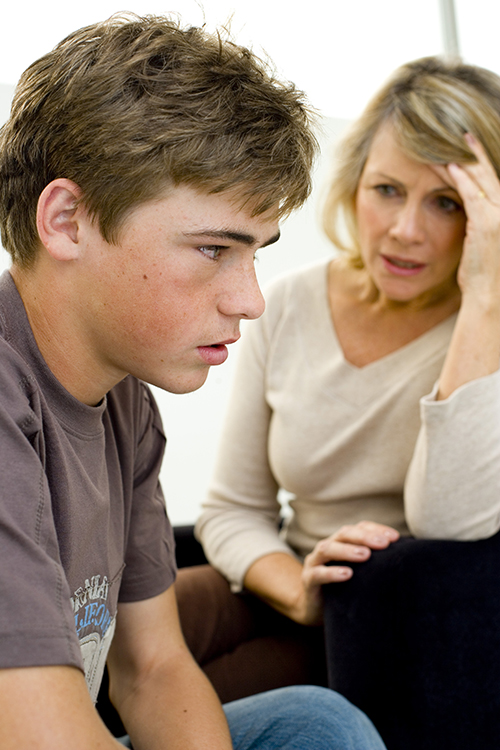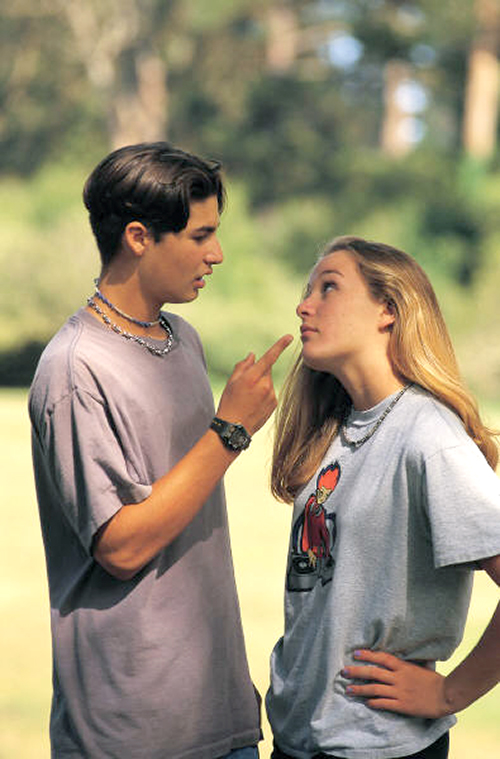Parenting About Sex, Pressure and Promiscuity
“The Talk” isn’t over when your son or daughter says their final “good night” and walks out the door where you’ve been sitting in private discussing the… ahem… “birds and bees” stuff — not, by a long shot!
Parenting: More than just “Birds and Bees”
And, actually, now that you’ve broken the ice on the subject it’s exponentially more easy to continue the momentum.
In fact, taking the effort to see that the momentum doesn’t slow is incredibly more easy and productive than to do it by crisis management in fits and starts.
If we’re talking about an 8, 9 or 10 year old here, you really do stand an incredible chance of making their life easier and more fulfilling by developing the correct attitudes which will help them make the right choices through some mighty turbulent times coming just around the corner!
Procrastinating and delaying truly will make your job exponentially more difficult, if you’re able to accomplish it at all.
Helping Teens Resist Sexual Pressure
Let’s look at what an expensive research study shows us about what contributes to teens making the wrong choices regarding sex.
Teens are more likely to have sex if they:
- Entered puberty early
- Socialize with youngsters who approve of and encourage sexual activity
- Place little value on education
- Have a poor relationship with their parents, particularly their father
- Rarely attend religious instruction or services
So, let me see if I’ve got this correct. Experts on the subject are telling us that the kids who are having sex too early are the ones who are aren’t educated in making the right decisions and avoid people who can teach them how while hanging around with the wrong kind of crowd without a moral compass, not listening to their parents and going through the temptation longer than all the rest.
Hmm… well, that sounds like it might do it to me – how about you?
Parenting your child about sex needs to begin by asking yourself how you’ve been, or are, doing with all the five categories. The first, is just a situation you may be dealt; but, if you are, you need to deal with it.
The remaining four, you can do something about and I’m sure you can think of several things you ought to do without me listing any here.
Attitudes about education, religion, friends and relationship with parents are topics which, if taken cavalierly by parents, are magnified two, three or four times by the kids.
A Positive Approach
Much, if not most, of the information about sex which is given to children is done in a “negative” approach – i.e. don’t do this, don’t do that, this is the bad that will happen, etc..
It’s incredibly important that all children learn the skills that will enable them to correctly make decisions, which does include knowing all resulting negative consequences; but, the same story can be given them taking the more positive, “flip-side” approach emphasizing the advantages.
You might begin by acknowledging that physical intimacy between two loving adult partners is beautiful and joyful, while also warning about the perils of experience that comes too early.
For example, you might begin: “When young people have sex before they’re ready, they usually end up regretting it. I’d really hate to see that happen to you.”
Then you need to bring them and their decision making into the process, so continue perhaps with: “Why do you think so many regret it?” and/or “Can you think of ways I might be able to help you?”
Abstinence is a (the only) fool-proof way to avoid an unplanned pregnancy. Simply, if you don’t have sexual intercourse, a girl can’t get pregnant.
You might also let them know that researchers have gone into schools and cities asking thousands of young people about their sex experiences privately and secretly. Some in New Zealand interviewed nearly one thousand young people, all in their mid-twenties, about their first sexual experiences.
On average, the men had become sexually active when they were seventeen; the women, at age sixteen. Looking back, the clear majority of women admitted that they now wished they’d held onto their virginity longer.
Asking those who were younger than 16 when they had first sex, over 70 percent lamented that they didn’t wait longer– many of whom revealed they were now living with substantial and significant life-limiting results of that former poor decision.
Helping Teens Resist Sexual Pressure
An effective entre to such a discussion with any child who happens to be involved in sports is by bringing up the method world-class competitors use to train for an event: visualization and practice. They first put themselves in a training situation where they can practice appropriate moves then think themselves through the situation over and over.
Regarding learning how to make correct decisions about sex, the same method can be used. Describe to them several plausible scenarios and let them describe how they could handle it; such as: [sixteen-year-old girl] Let’s say you’re kissing a boy who you really like in the front seat of his father’s car. You know he’s had too much to drink at a party and he starts to clumsily try to slip his hand under your bra. He’s a boy you’ve known for years but you’re not comfortable with him taking liberties like that and want to stop it from going further – yet without hurting his feelings unnecessarily.
You then ask your daughter: “What could the girl do or say to regain control of the situation? Is she being too timid? Should she be more forceful?”
Once you overcome the “inertia” of beginning the discussion, you will be surprised how easy it is to have a very rewarding experience with your son or daughter which you know will help them through their lives.
You can either make up scenarios about “another girl” or boy; or, you can use plausible scenarios happening directly to them and ask them: “If you were invited to a boy’s house and discovered after you got there that his parents were out of town, what would you do?” “What could you do?”
Or perhaps, Let’s say you’re out to a party with (fill in the blank) and accidentally see that he has had two beers. He isn’t staggering around drunk or slurring his words yet but what things do you want to think about and plan for?
Then that’s the time you steer the conversation around to: If he’s trying to avoid you seeing him drinking, is there a chance he might have had more?
– You’re too drunk to drive long before you begin staggering or slurring, even cops need training to do drunk tests.
– If he’s ‘under the influence of alcohol’ what other things might he want to do?
– If you challenged him that he was drunk, do you think he would admit it?
– Do you really want to have a discussion with him while he’s drunk?
Then the final teaching moment comes by asking: What could you do if something like that happens? If she doesn’t suggest it on her own, you can then suggest that: You could decide not to take any chances and catch a ride home from the party with other kids and avoid the awkward situation in the car.
Take my word for it, the pressure on teenagers to have sex is incredible. They not only have direct pressure to “do it” from their boy or girlfriend, their peers (boys and girls) are continually “(jab, jab, wink, wink) Didja do it?” Some may even fabricate or exaggerate their own experiences, thinking that will help them fit in.
Giving Teens the Words for Fending Off Unwanted Sexual Advances
Let me include here a list I found in an article by the American Academy of Pediatric’s (AAP) in their “Healthy Children” program. They are “Hooks” and “Sinkers” – languages that your child can use when confronted with them.
Hook
Sinker
“Aw c’mon, everybody does it!”
“I don’t care, I’m not everybody. And besides, not everybody ‘does it,’ including some of the kids who say they do.”
“If you loved me, you’d go to bed with me.”
“If you loved me, you wouldn’t pressure me into doing something that I’m not ready to do.”
“If you don’t have sex with me, I’ll break up with you.”
“If being your girlfriend means that I have to sleep with you, then I guess I don’t want to be your girlfriend.”
“Why won’t you have sex with me?”
“Because I don’t want to.” No further explanation needed.
“We had sex before; why are you turning me down now?”
“I’m entitled to change my mind. It’s my body and my life, and I want to wait until I’m older before I have sex again.”
“Yo, let’s do it. You know you want to!”
“No. No. No! What part of ‘no’ don’t you understand?”
“Your parents are out all night; let’s go back to your house.”
Use your ace in the hole: blame your folks. “Go back to my house? We can’t. My parents won’t let me have boys over when they’re not home.”
“Don’t your parents trust you?”
“Yes – to do just what I’m doing right now: saying ‘no!’ ”
[http://www.healthychildren.org/English/ages-stages/teen/dating-sex/pages/Helping-Teens-Resist-Sexual-Pressure.aspx]
12 Posts in Parenting - Sex (parenting-sex) Series
- Medical Consent by Teens For Their Own Care, by state – 3 Jun 2016
- Talking To Girls About Menstruation – 23 Apr 2016
- Link - Sexual attraction and orientation – 6 Sep 2015
- Parenting: Healthy Relationships – 2 Sep 2015
- Link - Am I ready for sex? – 31 Aug 2015
- Parenting about sex and peer pressure – 27 Aug 2015
- Talking to Your Teen About Sex – 13 Jul 2014
- Adolescent Gyn or Pelvic Exams – 11 Jun 2014
- Sexting, What Parents Should Know – 3 Jun 2013
- Sexting, What Teens Should Know – 1 Jun 2013
- Sexting: Risky Teen Behavior – 30 May 2013
- Parenting About Sex, Pressure and Promiscuity Series: Intro/Index – 28 May 2013



